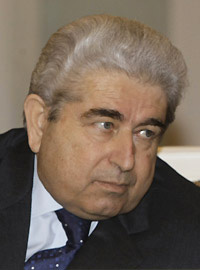 Image via Wikipedia
Image via Wikipedia
A cargo of confiscated munitions that exploded in July killing 13 men was the responsibility of the army and not the president who had never been informed of any immediate danger, a report on Cyprus-mail quoted government sources as saying at the weekend, as a document referring to the risks was made public two days before Demetris Christofias testifies at a public inquiry into the causes of the blast.
The document, a memo to the president dated September 6, 2010 and penned by the head of Christofias’ diplomatic office Leonidas Pantelides, said army officers “favoured destruction (of the munitions) due to some dangers posed by the high temperatures inside the containers during the summer”.
The memo was written after a meeting between Pantelides, Colonel Andreas Stavrou and Lieutenant Andreas Yennaris who belonged to the defence minister’s staff. The three men discussed whether the National Guard was in a position, from a technical point of view, to destroy the munitions.
The munitions, stored inside 98 containers, had been left exposed to the elements at the Evangelos Florakis naval base for over two years since their seizure from a ship sailing from Iran to Syria. They exploded on July 11 this year, killing 13 sailors and fire-fighters and knocking out the nearby power station at Vassilikos, sparking an energy crisis.
In the memo, Pantelides said “As I have already told you, I have spoken with the ambassador of Iran, who told me they would support this development (destruction) and would also speak to the Syrians so that they would also adopt this position. “In such a case we will reach out to the (UN) Security Council Sanctions Committee anew, to secure approval for destruction.”
The government responded yesterday by saying the leaked document debunked two lies: that the cargo was kept in Cyprus to be sent to Syria later on and that it had been Christofias’ decision not to destroy the munitions.
The document, a memo to the president dated September 6, 2010 and penned by the head of Christofias’ diplomatic office Leonidas Pantelides, said army officers “favoured destruction (of the munitions) due to some dangers posed by the high temperatures inside the containers during the summer”.
The memo was written after a meeting between Pantelides, Colonel Andreas Stavrou and Lieutenant Andreas Yennaris who belonged to the defence minister’s staff. The three men discussed whether the National Guard was in a position, from a technical point of view, to destroy the munitions.
The munitions, stored inside 98 containers, had been left exposed to the elements at the Evangelos Florakis naval base for over two years since their seizure from a ship sailing from Iran to Syria. They exploded on July 11 this year, killing 13 sailors and fire-fighters and knocking out the nearby power station at Vassilikos, sparking an energy crisis.
In the memo, Pantelides said “As I have already told you, I have spoken with the ambassador of Iran, who told me they would support this development (destruction) and would also speak to the Syrians so that they would also adopt this position. “In such a case we will reach out to the (UN) Security Council Sanctions Committee anew, to secure approval for destruction.”
The government responded yesterday by saying the leaked document debunked two lies: that the cargo was kept in Cyprus to be sent to Syria later on and that it had been Christofias’ decision not to destroy the munitions.
Read more: cyprus-mail





